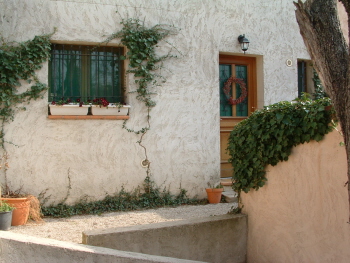
We’re chatting with author Mary Demuth again in southern France, though today she’s invited us in for coffee in her lovely French home. If you missed the first part of our interview, you can read it here.
Thanks for joining us at the blogging Carnival yesterday. I’m still full from all that Comfort Food. Now we’re ready for something to read. You’ve recently published two new books for parents. Can you tell us a little about your first one, Ordinary Mom, Extraordinary God?
I wrote that book because I was tired of books written for Christian moms and women that were dumbed down and foofy. I wanted an intelligent devotional for moms, one that challenged them at their deepest levels both spiritually and intellectually. It’s written in conjunction with Hearts at Home ministries.

Foofy! Yes, we’re tired of foofy! But why should a mom want to read your book? Are you going to tell us what it’s like to have it all together and make those of us who are scrambling to get through a day feel guilty?
Yes, of course. Parenting should be all about guilt and how terrible we are at measuring up. (laughing) No, seriously. That book is about grace. About running to Jesus when we fail. About the beauty of the journey of parenthood. I pray it is a cup of cold water to moms who are worried and stressed and harried and guilt-ridden.
Sounds refreshing. And I love the title. I’m truly one of those ordinary moms realizing what an extraordinary God we serve. So, what about your latest book that just came out last month — Building the Christian Family You Never Had. It says it’s a “Practical Guide for Pioneer Parents.” Can you tell us what you mean by pioneer parent?
A pioneer parent is a person who grew up in a home she doesn’t want to duplicate. It’s for any parent who fears she’ll make the same mistakes her parents made. It’s for those of us who don’t exactly know what a Christian home looks like because we didn’t see it modeled.
I like the quote you used in the preface of the book from George Bernard Shaw: “If you cannot get rid of the family skeleton, you may as well make it dance.” Later, you say, “God is our Pioneer Parent, who dances the path before, behind, and beside us.” It seems like your attitude is that you can’t change the past, but you can start fresh with your own family. Is that true?
Yes, it’s true. But starting fresh does involve some pain. We must first look at our past, tell the truth about it, forgive our parents, and allow Jesus to heal us. Then we can start fresh. But healing precedes that new path.
What advice do you have for pioneer moms and dads who feel unsure about raising kids since they grew up in a dysfunctional family? Can you offer them any words of encouragement?
I hope so. This is what God has taught me — something spectacular actually: Our weakness in parenting — all those fears that we’ll duplicate the homes we were raised in — is actually a benefit. Because pioneer parents are keenly aware of our own inabilities, it puts us at an advantage. Because we’re well acquainted with our own lack, we are more apt to run to Jesus for help. So, the hope is, God can be strong in our weakness. Because we know we’re weak, we’re at an advantage, because God loves to work through that weakness.

Wow. That’s something I’m going to have to remember. You talk a lot about healing in this book, as you’ve had some emotional scars from your past. But you also give us ideas of fun things to move forward as a family. Can you tell us about some of your family celebrations that are unique?
We play ‘high low’ around the dinner table every night. We share one high and one low from the day. It’s an expected ritual. It helps us all focus on what happened during the day and also gives us a glimpse into our children’s lives. We also have a prayer blackboard where we list our prayer requests. It’s fun to watch God answer those prayers.
Those are great ideas! We’ll have to try the high/low thing around our table. In your book, you have a chapter called “A Funny Thing Happened While Raising My Kids.” Can you tell us how the role of laughter plays in building up a strong Christian family? What if we’re not comedians?
Laughter is key. Most pioneer parents grew up far too fast and have lost that child-like wonder at the world. I’m far too serious, but I’m learning to let my hair down. I’m certainly not a comedian. But my kids are. One of the things I do is write down all the funny things my kids say so we can remember them. Having fun with our kids is a natural offshoot of learning to take life less seriously.
I love the idea of a notebook — thanks for the reminder. What’s the funniest thing that’s happened to you since living in France?
It’s a long story, but you can read all about it in my blog.
Do you write every day? How do you balance your career with your family?
Yes, I write every day. I have a schedule. I usually write about 20-30 hours a week depending on my deadline. I try not to let my writing interfere with my children, as I write while they’re in school. It’s still hard for me, though, to pull myself away from the computer when I’m in the middle of a thought or idea. I’m learning.
You seem to have an interest in helping out new writers. Can you tell us a little about the newsletter you write every month? How can we sign up for it?
It’s called the RelevantProse Newsletter and comes in the inbox the first of every month. It’s usually about 8 pages long, full of practical writing advice and spiritual insights. I write about the business and craft of writing. You can sign up for it on my website.
And now, to wrap things up, can you tell us your best piece of advice on making our home Christ-centered?
Pray. Be authentic. Apologize to your children when you yell. Pray some more.
Wow. How inspiring! Thanks for sharing so many great ideas with us, Mary. Your books look like wonderful resources for parents. Au revoir.
Au revoir!
If you have a minute, you simply must go read Mary’s hilarious story, The Boy Without a Costume. The ending really made me laugh! And if you love good women’s fiction, Mary has a new novel out called Watching the Tree Limbs.






3 Responses to Mary DeMuth’s Books for Parents